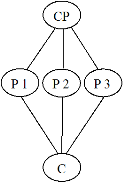阅读理解。
Why texting harms your IQ
The regular use of text messages and e-mails can lower the IQ more than twice as much as smoking
marijuana (大麻). That is the statement of researchers who have found that tapping away on a mobile
phone or computer keypad or checking for electronic messages temporarily knocks up to 10 points off
the user's IQ. This rate of decline in intelligence compares unfavorably with the four-point drop in IQ
associated with smoking marijuana, according to British researchers, who have described the
phenomenon of improved stupidity as "infomania". The research conducted by Hewlett Packard, the
technology company, has concluded that it is mainly a problem for adult workers, especially men.
It is concluded that too much use of modern technology can damage a person's mind. It can cause a
constant distraction of "always on" technology when employees should be concentrating on what they are
paid to do. Infomania means that they lose concentration as their minds remain fixed in an almost
permanent state of readiness to react to technology instead of focusing on the task in hand. The report
also added that, in a long term, the brain will be considerably shaped by what we do to it and by the
experience of daily life. At a microcellular level, the complex networks of nerve cells that make up parts
of the brain actually change in response to certain experiences.
Too much use of modern technology can be damaging not only to a person's mind, but to their social
relationship. 1100 adults were interviewed during the research. More than 62 per cent of them admitted
that they were addicted to checking their e-mails and text messages so often that they scrutinized
work-related ones even when at home or on holiday. Half said that they always responded immediately
to an email and will even interrupt a meeting to do so. It is concluded that infomania is increasing stress
and anxiety and affecting one's characteristics. Nine out of ten thought that colleagues who answered
e-mails or messages during a face-to-face meeting were extremely rude.
The effects on IQ were studied by Dr Glenn Wilson, a psychologist at University of London. "This is
a very real and widespread phenomenon," he said. "We have found that infomania will damage a
worker's performance by reducing their mental sharpness and changing their social life. Companies
should encourage a more balanced and appropriate way of working."
1. We can learn from the passage that "infomania" ______.
A. has a positive influence on one's IQ
B. results in the change of part of the brain
C. lies in the problem of lack of concentration
D. is caused by too much use of modern technology
2. The research mentioned in the passage is most probably about ______.
A. the important function of advanced technology
B. the damage to one's brain done by unhealthy habits
C. the relevance between IQ and use of modern technology
D. the relationship between intelligence and working effectiveness
3. The underlined word "scrutinized" probably means "______".
A. examined carefully
B. copied patiently
C. corrected quickly
D. admitted freely
4. Which of the following shows the structure of the passage?




